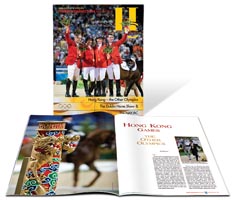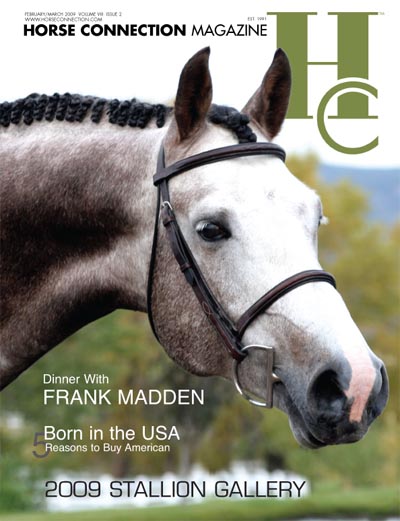
My Dinner with Frank Madden – February 2009
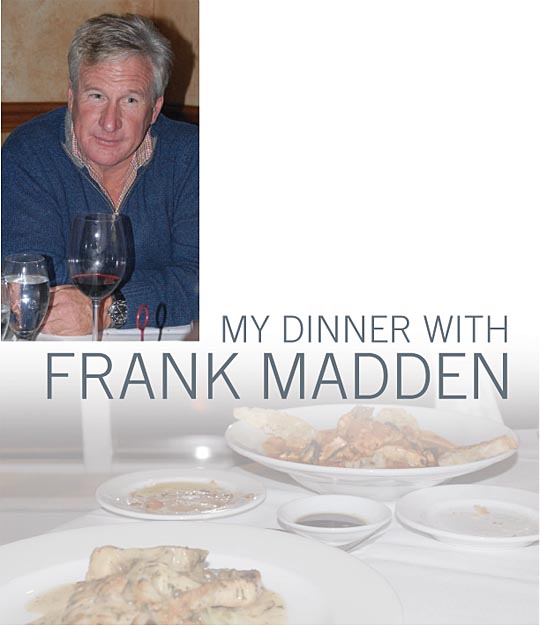
Geoff Young
It was a snowy and cold morning when we first met. He was giving a lesson and I was lurking around with my camera, cursing the low light of the indoor arena and cursing myself for eating that delicious chocolate glazed doughnut in the viewing lounge. I don’t get up this early on a cold snowy morning but he doesn’t come to Colorado very often, in fact, he was here for his first mile high clinic.
Eight hours later and 20 degrees warmer (typical Colorado weather), I was pulling into the parking lot of my favorite Italian restaurant–Venice. I was looking forward to dinner and conversation with one of the most charming and down-to-earth trainers in the horse game today. With celebrity clients, TV appearances, and a last name made famous, not only by the accomplishment of he and his brother, but by his superstar sister-in-law, who is known simply as Beezie (no last name required), Frank Madden and I were about to sit down to some great wine and some fine stories.
After toasting with a glass of beautiful super Tuscan red, I asked Frank about his prominent role in Animal Planet’s Horsepower–the road to Maclay, a reality TV show about showjumping and the young riders and trainers who compete for the Medals. It was a smash hit with horse people, but there aren’t enough of us to skew the ratings so it only lasted one season. It did however raise the profile of Frank Madden.
“So you’re a television celebrity now. That must have been an unexpected turn of event for you.”
“Totally unexpected. They cast a lot of different trainers and riders for the show and they had a good contrast between Andre’ Dignelli and myself.”
“Did it affect the way you related to your students when the cameras were rolling?”
“From my perspective, I wanted to be able to do my job number one, number two, I wanted to try to give them enough content so that it would turn out to be a nice thing for our industry and a good product for Animal Planet. I think it worked well as a television show.”
“Have a lot of people recognized you from that show?”
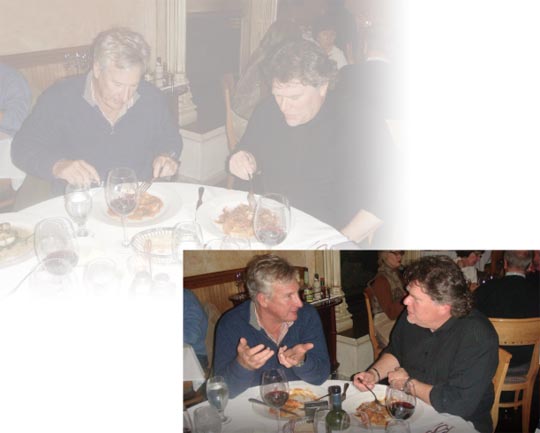 “I’ve got a funny story regarding that. I was at the American Invitational the year after the show aired. I got up early to walk the course and all of these kids and trainers came up to me like I was a celebrity, asking for autographs – it was so funny. Anyway, I got up to the stands and see the Springsteen’s who are clients. Bruce and Patti are sitting four seats away and they’re watching the class. During the class, 20 to 30 kids kept coming over to me to ask for autographs – with Bruce Springsteen sitting a few seats over! So, Bruce gave me a little bit of a hard time saying, ‘Big celebrity now.’ Anyway, Beezie happens to win that night and they throw this big party in one of the suites at Tampa Stadium. So, I’m heading over to the party with some people and I notice this man and his wife and two kids. Suddenly the guy comes up to me and says, ‘My wife wants me to ask you a question.’ Sure, I said, what’s up? He said, ‘my wife wants to know who is more famous here than Bruce Springsteen?’ “
“I’ve got a funny story regarding that. I was at the American Invitational the year after the show aired. I got up early to walk the course and all of these kids and trainers came up to me like I was a celebrity, asking for autographs – it was so funny. Anyway, I got up to the stands and see the Springsteen’s who are clients. Bruce and Patti are sitting four seats away and they’re watching the class. During the class, 20 to 30 kids kept coming over to me to ask for autographs – with Bruce Springsteen sitting a few seats over! So, Bruce gave me a little bit of a hard time saying, ‘Big celebrity now.’ Anyway, Beezie happens to win that night and they throw this big party in one of the suites at Tampa Stadium. So, I’m heading over to the party with some people and I notice this man and his wife and two kids. Suddenly the guy comes up to me and says, ‘My wife wants me to ask you a question.’ Sure, I said, what’s up? He said, ‘my wife wants to know who is more famous here than Bruce Springsteen?’ “
“That’s classic, a great story. It must be exciting having famous clients like The Boss. I’ll bet you can get us front row seats to his concert.”
“Well, there are some little perks. I’m satisfied and content with the fact that I’ve been able to do something that I love and have been able to follow my passion. But I’ll tell you, the places it has brought me and the people that I’ve met over the years is priceless!”
“I’d have to agree with you on that. The people and places we’ve experienced through HC and the horse industry is unbelievable.”
“When I was working for George Morris, Paul Newman and his wife Joanne sent their daughter, Claire, to come ride. And I got to know the Newmans quite well – got to stay at their home in Connecticut a few times. To meet someone like Paul Newman and become somewhat of a friend with him and to stay at his house – those are some great life experiences.”
“It seems like those celebrities that have and ride horses are more down-to-earth and genuine than other celebs. Paul Newman was always noted for being so genuine and generous. That is some good company you’ve been in Frank.”
“Like I said earlier, the sport has been incredibly generous to me. I’ve never looked at it as a monetary return, you know? I get a huge return every day I do this.”
“Who were early influences in your riding?”
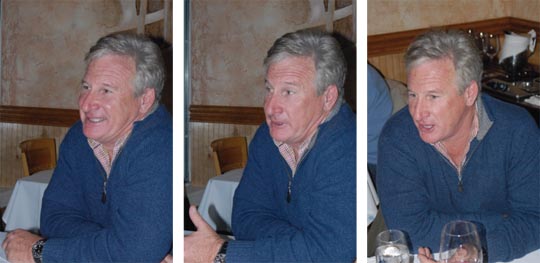
“Jimmy Williams was an influence in my late teens, early 20’s. George Morris was a huge influence. I rode for him for eight or nine years. I’ll never forget the time I heard George Morris say to a kid, ‘I’ll forget more than you’ll ever know.’ I was an impressionable 21 year old and when I heard that it just rocked me back on my heels. I couldn’t imagine anyone saying that to me and I would never say that to someone, but now that I’m older, I sure understand what he meant. It’s not an egotistical statement – it’s reality. When you understand what it takes to win a championship and to lose one…”
“You quit riding and became a trainer. Any regrets?”
“No, I really like the training part and I really love the teaching part. I made a commitment to spend the balance of my life, not only to try to be a great trainer, but to really study it. It’s interesting that the people who have influenced me as a trainer are people outside of the horse sport. People like football coach Bill Belichick and gymnastics coach Bela Karoly. I did an article for a magazine where Bela and I were comparing training young athletes for gymnastics and training young athletes for showjumping. To get to pick someone’s brain like that was so interesting. I really admire people who can take charge in their sport.”
“It appears that you really embrace the team concept.”
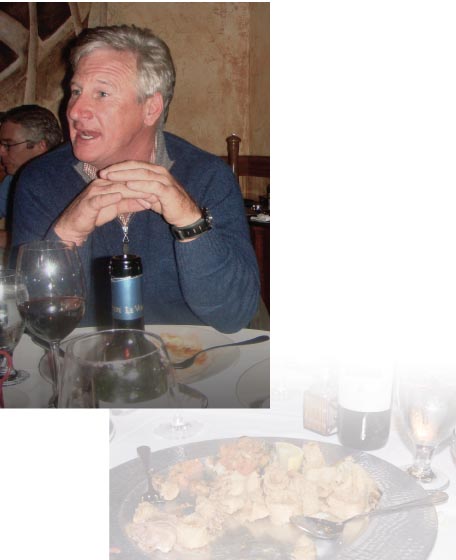 “I don’t look at myself so much as a riding teacher but more like a riding manager and a team manager. Training a horse or rider is a small part of it. It’s managing – the sponsors, the parents, and you have to manage your help and your assistants. And then you have to find the horseflesh. It’s kind of like putting a football team together. You need the talent on the field and off the field. That’s the exciting part of the sport for me.”
“I don’t look at myself so much as a riding teacher but more like a riding manager and a team manager. Training a horse or rider is a small part of it. It’s managing – the sponsors, the parents, and you have to manage your help and your assistants. And then you have to find the horseflesh. It’s kind of like putting a football team together. You need the talent on the field and off the field. That’s the exciting part of the sport for me.”
“You enjoy training young riders as opposed to older, more seasoned competitors don’t you?”
“My favorite age of student to work with in the sport is between the ages of 12 and 18. After that what happens is there’s less instruction involved and more management involved. My brother John and my sister-in-law Beezie, who has been to two Olympics, are great examples of this. John might help Beezie with some training issues but Beezie does most of it and John is out there dealing with new investors, and new sponsors. And you need to find investors so you can go find new horses. That is a very important job at this level of the sport. Beezie knows how to go to the Olympics and win gold medals, but how do you make the rest happen? It’s very difficult, it takes a team.”
“Frank, I’ve got to tell you, I’m really enjoying this conversation and this dinner.”
“You know, the reason we do what we do and the reason we’re here having dinner and talking is that we love horses. And the interesting thing about a horse is that they are a contradiction unto themselves.”
“What do you mean by contradiction?”
“What I mean by that is there are great refusals and there are bad refusals. And there are times when a horse will do a jump and it’s the best thing in the world they could’ve done for you, and it’s the same thing that can break your neck. And that’s what I mean by contradiction. They are mystical animals and they become so adaptive to whatever situation you put them in. They spoil us, they allow us to become victims of their nobility – to the point where we take them for granted.”
“Yeah, I suppose we do take them for granted because they always do for us what we want them to.”
“Absolutely. When you get to a horse show there’s a course posted, and we look at it like idiots and go over it again and again in our minds. Then, because we’re so stupid, they let us walk the course, and we’re spending all this money to do it with a trainer to help us. And then we get on this poor horse and school him while we’re a nervous pile of energy on their back, making every mistake known to man. We’re lying to the horse, we’re cheating them, and we forget where we’re going. And then the trainer says, ‘are you ready?’ And because we have no idea we go to the ring gate. And the poor horse is thinking, is the first jump off the left lead or the right? Is it a vertical or an oxer? Is it part of a line? And you gotta say to the horse, ‘I want you to win with me, despite me!’ And then, when the poor horse makes a mistake, the only thing the rider can remember when they come out of the ring is, ‘this son-of-a-gun let me down.’ That’s the pathetic part of our sport.”
“I agree. I’ve always admired the riders who always take the full responsibility, because that is their responsibility!“
“If you can’t take on that responsibility, you’ll never make it. And the other thing I wanted to add is how noble the horse is. Because, after it’s all done and said, they get cooled down, put away, fed, and you know what? They’re happy as clams! And 90% of them are nice enough, or noble enough, or dumb enough, to come back and let you do it all over again!”
“Maybe that’s the connection. Horses will put up with our crap time after time after time. Horses and dogs.”
“You know, I feel my purpose in all of this is not to win championships, my purpose is to give the relationship between riders at any level and horses at any level, harmony and respect towards one another. That’s all I’m interested in, and along that process, if I get a great horse and a great rider and end up having a championship pair, it’s icing on the cake. And it’s no more than that. To me, the sign of a great trainer is when you can deliver the fundamental messages in so many interesting ways that the students want to stick to the fundamentals. I look at painting as an art, music as an art, and I look at riding as an art. When you can master the fundamentals of an art, you have the freedom to be whatever you want to be. And fundamentals are what give you the wings to express yourself.”
“I think that says it all Frank. It’s getting late and you’ve got a clinic in the morning. Thank you for an interesting and entertaining evening and speaking of wings, wherever you go, I know it will be a good flight.”

